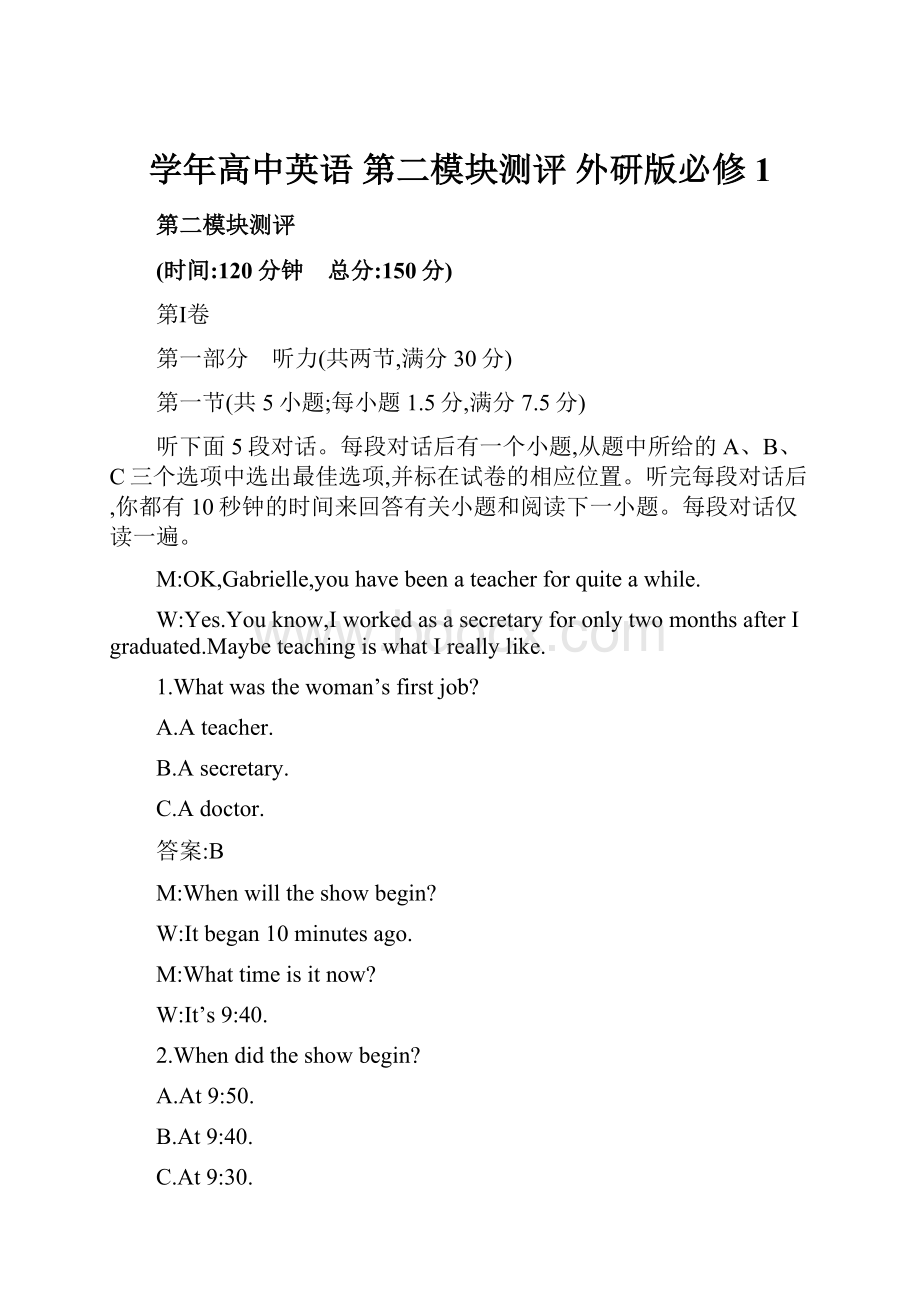学年高中英语 第二模块测评 外研版必修1.docx
《学年高中英语 第二模块测评 外研版必修1.docx》由会员分享,可在线阅读,更多相关《学年高中英语 第二模块测评 外研版必修1.docx(25页珍藏版)》请在冰豆网上搜索。

学年高中英语第二模块测评外研版必修1
第二模块测评
(时间:
120分钟 总分:
150分)
第Ⅰ卷
第一部分 听力(共两节,满分30分)
第一节(共5小题;每小题1.5分,满分7.5分)
听下面5段对话。
每段对话后有一个小题,从题中所给的A、B、C三个选项中选出最佳选项,并标在试卷的相应位置。
听完每段对话后,你都有10秒钟的时间来回答有关小题和阅读下一小题。
每段对话仅读一遍。
M:
OK,Gabrielle,youhavebeenateacherforquiteawhile.
W:
Yes.Youknow,IworkedasasecretaryforonlytwomonthsafterIgraduated.MaybeteachingiswhatIreallylike.
1.Whatwasthewoman’sfirstjob?
A.Ateacher.
B.Asecretary.
C.Adoctor.
答案:
B
M:
Whenwilltheshowbegin?
W:
Itbegan10minutesago.
M:
Whattimeisitnow?
W:
It’s9:
40.
2.Whendidtheshowbegin?
A.At9:
50.
B.At9:
40.
C.At9:
30.
答案:
C
W:
Well,Imustgohomenow.It’sgreatseeingyouagain.
M:
Oh,it’sniceseeingyoutoo.
3.Whatarethetwospeakersdoing?
A.Enjoyingmeetingtheirfriend.
B.Sayinggood-byetoeachother.
C.Planningtoseeeachotheragain.
答案:
B
M:
WhatcanIdoforyou,madam?
W:
I’mlookingforanewdressformydaughterasaChristmaspresent.
4.Wheredoesthedialoguetakeplace?
A.Inanoffice.
B.Inaclothingshop.
C.Intheman’shouse.
答案:
B
M:
I’mfeelingkindofsicktonight.Idon’tknowifIhaveavirus,orifit’ssomethingIateforlunch.Maybeweshouldstayathometonight.
W:
Ithinkyou’reright.Ifeelalittleundertheweathermyself.
5.Whatwillthewomandotonight?
A.Shewillstayathomewiththeman.
B.Shewillsendforadoctorbyherself.
C.Shewillwatchtheweatherforecast.
答案:
A
第二节(共15小题;每小题1.5分,满分22.5分)
听下面5段对话或独白。
每段对话或独白后有几个小题,从题中所给的A、B、C三个选项中选出最佳选项,并标在试卷的相应位置。
听每段对话或独白前,你将有时间阅读各个小题,每小题5秒钟;听完后,各小题将给出5秒钟的作答时间。
每段对话或独白读两遍。
听第6段材料,回答第6、7题。
M:
Hi,May.Doyoulivefarfromtheschool?
W:
Yes,veryfar.Ittakesmeonehourbybus.
M:
Whydon’tyourideabike?
W:
Thereisalotoftraffic.
M:
That’snotaproblem,ifyouarecarefulenough.Igotoschoolbybikeeveryday.
W:
I’lltry.
6.Howdoestheboygotoschooleveryday?
A.Bybus.
B.Bybike.
C.Onfoot.
答案:
B
7.Whydoesn’tthegirlgotoschoolbybike?
A.Becauseshehatestheheavytraffic.
B.Becauseshedoesn’thaveabikeherself.
C.Becauseshedoesn’tliketorideabike.
答案:
A
听第7段材料,回答第8、9题。
W:
Wasthereanaccidentonthefreewaytoday?
M:
Youhaven’theardaboutit?
W:
No,doyouknowwhathappened?
M:
Acarknockedintoatruck,butstrangelyenoughthetruckturnedover.
W:
Areyouserious?
M:
I’mtellingyouthetruth.
W:
Didanyonegethurt?
M:
Twopeoplewereinjured.
W:
Well,it’sunbelievablethatnoonewaskilled.
M:
Yes,theywerelucky.
8.Wheredidtheaccidenthappen?
A.Inthestreet.
B.Onafreeway.
C.Onaroad.
答案:
B
9.Whatwasstrangeabouttheaccident?
A.Twopeoplegothurt.
B.Thetruckturnedover.
C.Onepersonwaskilled.
答案:
B
听第8段材料,回答第10至12题。
M:
Hello,Susan.HowiseverythinginNewYork?
W:
Neverbetter,Henry.Howareyou?
Howisthefamily?
M:
Everyoneisfine,butactuallyIamfeelingalittletiredthesedays.
W:
Youaregettingolder,Henry.Andyouareheavierthanyouusedtobe.
M:
Everyonegetsolder,butyoulookyoungerthanever.What’syoursecret?
W:
Thereisnosecret.Igetmoreexercisethanyou,andIammorecarefulaboutmydiet.Youshouldbe,too.
M:
Youareright.Whentheweatheriswarmer,I’lldoit.
W:
No,Henry.Youshouldstartnow.
M:
OK,I’llstarttoday.Thankyoufortheadvice.
10.Wh
atdoesSusanthinkofherlifeinNewYork?
A.Shedoesn’tlikeitatall.
B.Shethinkshighlyofit.
C.Shefeelsitjustso-so.
答案:
B
11.WhatcanwelearnaboutHenryfromthedialogue?
A.Heisheavierthanbefore.
B.Helooksyoungerthanever.
C.Hedecidestokeeponadiet.
答案:
A
12.WhydoesSusanlookyounger?
A.Becausesheisfullofenergy.
B.Becauseshestaysinwarmweather.
C.Becauseshelivesahealthierlife.
答案:
C
听第9段材料,回答第13至16题。
W:
So,whatareyougoingtodothissummer?
M:
Well,I’mprobablygoingonholidaywithmyparentsforaweek,butIreallyhopeIcangetasummerjobinamarket.Whataboutyou?
W:
I’mgoingtoScotlandforthesummer.
M:
Forthewholesummer?
W:
Yes,well,I’mgoingforsevenweeks.I’mgoingtoworkinahotelinthemountains.
M:
Really?
Thatsoundsgreat!
W:
Yes,Ithinkso.Imean,theworkwon’tbeveryinteresting.It’llbemostlycooking,cleaningandworkingonreception,sellingdrinksandthings.Butmyhoursareseventillteninthemorningandfivetillnineintheevening,soI’llhaveplentyoftimeduringthedaytogowalking.
M:
IwishIcouldgetajoblikethat.Howdidyoufindit?
W:
IreadaboutitinabookcalledSummerWorkRoundBritain.Ittellsyouaboutallkindsofdifferentjobsindifferentplaces.Youcanworkatfarmspickingfruit,orathotelsnearthesea.Youcanevengetworkatmusicfestivals.
13.Wherewillthewomanplantoworkinsummer?
A.Inahotel.
B.Inamarket.
C.Onafarm.
答案:
A
14.Howlongwillthewomanworkinthemorning?
A.Onehour.
B.Threehours.
C.Fourhours.
答案:
B
15.Whatwillthewomanprefertodoinherfreetime?
A.Gowalking.
B.Pickfruits.
C.Selldrinks.
答案:
A
16.Whatarethetwospeakerstalkingaboutingeneral?
A.Study.
B.Musicfestivals.
C.Summerplans.
答案:
C
听第10段材料,回答第17至20题。
M:
Weareluckytohaveinthestudiotoday,MollyTaylor.Mollyisarranginganactivitycourseforthesummerholidays.Molly,thisisthesecondyearofthecourse,isn’tit?
W:
Yes,that’sright.Thesummercourseoperatedlastyearforasix-weekperiod.Wedidthinkaboutmakingitlongerthisyearandhaveaseven-weekcourse,assomeschoolsfinishtheirtermaweekearlier.Butintheendwedecidedtokeeptothesameplanaslastyear.Andwewereactuallyverysurprisedlastyearbythenumberofpeopleinterestedinthecourse.Wedidn’tactuallyhaveenoughworkerstolookafterallthechildrenwhowantedtoattendandwehadtoturnpeopleaway.Therewassuchalotofrainthatwehadtoorganizeartandmusicactivitiesindoors.Thisyearwealsoconsideredprovidingsomemoreexcitingadventuresportslikerockclimbingandcaving.Wedecidednotto,intheend,becauseitwouldmakethecoursealotmoreexpensiveforparents.Instead,we’reintroducingsomefunprojects.Forexample,we’regoingtoputonatalentshowandorganizeanAmericanNight.Ithinkitwillbegoodfunforthekids,andteachthemgoodskillstoo.Asparents,youshouldgotomywebsite,andprintoutanapplicationform.Sendittomyofficeaddressassoonaspossible,becausetheplacesaregoingfast.Wedoneed
toknowifthechildhasanyspecialneedsregardingtheirdiet.
17.Howlongwillthecourserunthisyear?
A.Sixweeks.
B.Sevenweeks.
C.Eightweeks.
答案:
A
18.Whatwastheproblemlastyear?
A.Fewpeoplewantedtoattend.
B.Thereweretoofewworkers.
C.Nothingtodoonrainydays.
答案:
B
19.Whatwillthechildrendothisyear?
A.Theywilljoininrockclimbing.
B.Theywilldonewoutdoorsports.
C.Theywillattendatalentshow.
答案:
C
20.What’simportantforparentswhosechildrenattendthecourse?
A.AttendingtheAmericanNightwiththechildren.
B.SendingmoneytoMollyassoonaspossible.
C.InformingMollyaboutanyfoodthechildcannoteat.
答案:
C
第二部分 阅读理解(共两节,满分40分)
第一节(共15小题;每小题2分,满分30分)
阅读下列短文,从每题所给的四个选项(A、B、C和D)中选出最佳选项。
A
Here’ssomethingtothinkaboutthenexttimeyouaskyourteacherforhelp:
tryinghardtodoschoolworkonyourowncanhelpyoulearn.Accordingtoarecentstudy,themoreyoutrywhileyouarelearningnewinformation,thebetteryoucanrememberitlater.
Thismightsurpriseyou.Whenteachersarepresentingnewinformation,theyoftengivestudentslotsofhelp.Butanewstudyshowsthismaynotbethebestwaytosupportlearning.“Don’tbetooquicktogethelpwhenlearningsomethingnew,”educationalexpertManuKapursaid.“Trytoworkonityourselfevenifitmeanstryingdifferentways.”
Kapurcameupwiththeideathattryinghardcanleadtobetterlearning.ThenhetesteditoutonstudentsinSingapore.Heseparatedstudentsintotwogroups.Inthefirstgroup,studentswereaskedtosolvemathsproblemswiththeteacher’shelp.Inthesecondgroup,studentswereaskedtosolvethesameproblemsbyhelpingoneanother,insteadofgettinghelpfromtheteacher.
Withtheteacher’shelp,studentsinthefirstgroupwereabletofindthecorrectanswers.Studentsinthesecondgroupdidnotsolvetheproblemscorrectly.Buttheydidcomeupwithalotofgoodideas.
Thestudentswerethentestedonwhattheyhadlearned.Thegroupwithoutanyhelpfromateacherscoredmuchhigherthanthegroupwhohadhelp.Kapursaidworkingtofindtheanswershelpedstudentsunderstandtheprocess(过程),notjustthesolution.
Kapur’sadviceforkidsistoputalotofeffort(努力)intolearningsomethingnewratherthangoingtoyourteacherforhelp.“Simplydoingalittleworkornothingatallwon’twork,”saysKapur.“Trytosolveaprobleminasmanywaysaspossible.”
21.Whatisthebesttitleforthetext?
A.WorkYourMind
B.PracticeMakesPerfect
C.TheBestWaytoLearn
D.Teachers’RoleinSchoolwork
答案:
A
解析:
主旨大意题。
文章首先提出,自己越努力解决问题,越能牢固记忆新知识。
接着通过实验结果证明了这一点:
没有老师帮助的学生在做数学题时,虽然没有做对,但想出了不少好主意,且在考试中获得较高的分数。
最后作者再次通过研究者的话表明:
要尝试多种方法解决问题,多动脑。
22.ManuKapurholdsthat .
A.it’snecessaryforstudentstoaskforteachers’help
B.studentsshouldtrytosolveproblemsbythemselves
C.studentswithteachers’helphavemoregoodideas
D.studentsinthefirstgroupareclevererthanthoseinthesecondgroup
答案:
B
解析:
推理判断题。
根据第二段ManuKapur说的话可知,他鼓励学生们自己解决问题。
23.Theauthordevelopsthetextmainlyby .
A.presentingresearchfindings
B.comparingdifferentopinions
C.showingscientificinformation
D.settingdowngeneralrules
答案:
A
解析:
推理判断题。
作者在第一段提出结论,在第二至第五段引用实验来说明这一结论,在最后一段建议学生该怎么做。
由此可知,作者通过实验结果来证实文章观点。
B
Atwenty-nine-year-oldkindergartenteacherfromMarylandwasnamedNationalTeacheroftheYearin2006.OnJunefirstshewouldbeginayearasanationalandinternationalspokeswomanforeducation.
KimberlyOliverwasthefirstNationalTeacheroftheYearf